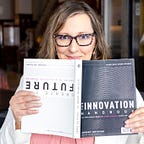How to Preserve Your Time and Energy with “No”
In 2014, I undertook a personal challenge: “The Year of Saying ‘Yes!’” I decided to take every opportunity that came my way, despite my actual level of interest or growth opportunity. For the first few months, I excitedly said yes to board of director positions, pro bono work, organizing multiple events, and local fundraisers. I also tried to tackle every opportunity I created for myself, including writing books, articles, and workshops for my own business and others. By December, when I was evaluating the experience, I was not only seriously burned out, I was seriously questioning my sanity. The challenge, however, taught me an extremely important lesson for 2015 and beyond; the power of “no.”
Fear of Hearing and Saying “No”
For some reason, many of us have a fear of hearing and saying no. How many unasked questions and risks not taken are due to that fear? No is a simple, powerful word, but is it really better to not use it? Is giving into the fear and not taking a risk giving into failure? Is failure the ideal result? I pondered these questions and thoughts constantly during my year-long experiment. Why was I saying yes to so many things — most of which have little consequence? By saying yes to things that did not excite or interest me, I risked saying no to things that mattered.
I had to answer a scary question: “What is the worst that can happen if I hear or say ‘no?’” I learned that saying and hearing that little word allows for more focus on solving other problems. If I asked for permission and did not receive it, I gave myself permission to pursue something else. If I am approached by an opportunity that does not fit my personal interests or goals, I was allowed to put more focus on myself, my business, my family, and my priorities. Saying no is placing a value on your time and expertise. It helps you commit to projects that boost and promote growth. Burn out from over-commitment can squash your mood, self-worth, and creativity. Saying no allows us to control our time and personal well-being.
What’s the worst that could happen?
When I decided to undertake this challenge, I hoped that I would gain a larger network, varied experience on different types of projects, and the ability to try new things. What I didn’t take into consideration was how often I’m asked to pitch in or help out. I also realized that the reasons I decided to do a year of yes were good, but that I was not going to achieve the results I wanted. For an entire year, I had to ignore the little voice inside my head that says “is this really worth your time?” I gave in to every request, whim, and opportunity, and it made me feel worse than if I’d said no.
We often feel that saying no creates hurt feelings. There is a huge fear of missing out or being seen as a disagreeable person when we say no to an opportunity. We also feel that if we turn something down now, we will miss out on other, future opportunities. When we are feeling negative thoughts, we need at to ask ourselves: “Am I saying yes out of passion, or guilt? Which is better for both parties involved?” By saying no, you allow yourself to only take on commitments where you can feel successful, in control of your decisions, and like you are actually contributing to a cause you believe in.
How to go from “yes” to “no?”
Keeping an arsenal of proper, straightforward, and polite responses to people who want your time is key to navigating the avalanche of requests. By recommending a person who is a better fit, you not only help two individuals or entities with aligning goals collaborate, but you do not have to feel guilty for saying no. Honestly saying where you’d like to contribute to future projects allows you to bow out at a time where you cannot commit, but also keeps the door open. Sometimes the best way to say no is just that simple — no, thank you though. Show your appreciation for the request, but kindly (and firmly) decline, and do it without feeling guilty.
Ask yourself — are you the best version of yourself when you are zapped from too many yeses? I’m going to guess that that answer is a very solid, emphatic “no!” By only taking on obligations that really matter, you gain control of your time and commitments. Keeping stressful obligations at bay allows you to focus your time and energy on the things that actually matter. By saying no to things that do not fit your personal and business goals, you are saying yes to your greatest asset: your time, as well as possibilities for collaboration in things that matter. Your future sanity and opportunities for growth will thank you.
